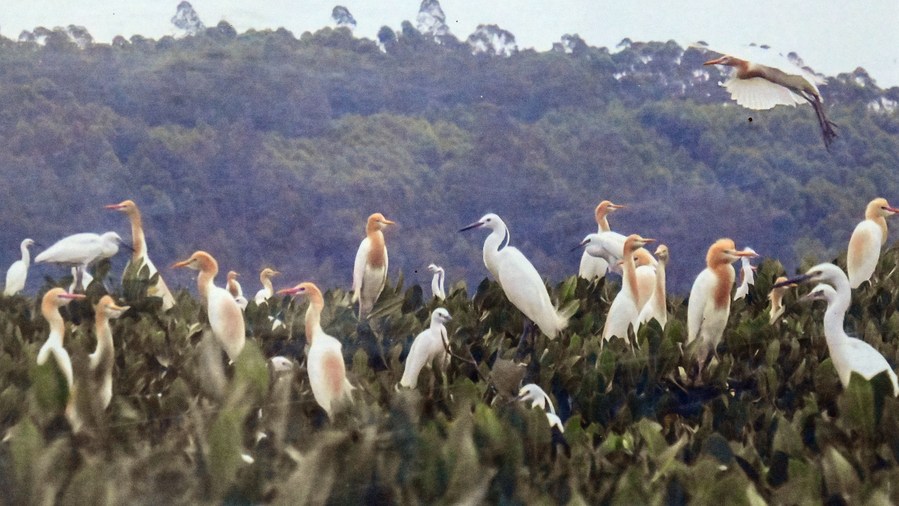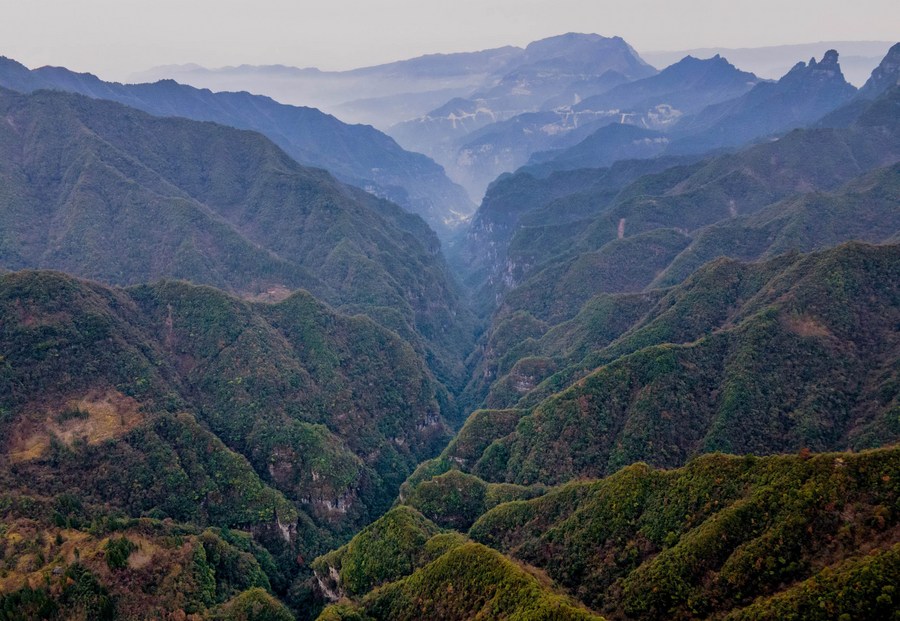China can lead the way in global biodiversity, says int'l Initiative head

This photo taken by an infrared camera on April 9, 2023 shows a black bear in Gaoligong Mountain National Nature Reserve, southwest China's Yunnan Province. (Xinhua)
China emerges as the global biodiversity hero and sustainability leader, pioneering ambitious plans to reverse biodiversity loss and combat climate change, according to Marco Lambertini, head of the Nature Positive Initiative.
by Martina Fuchs
GENEVA, Jan. 8 (Xinhua) -- China is "the hero of global biodiversity" and plays a fundamental role in the sustainable development agenda, the head of the newly-launched Nature Positive Initiative told Xinhua in a recent interview.
Speaking ahead of the annual meeting of the World Economic Forum (WEF) in Davos, Switzerland, next week, Marco Lambertini said that China is leading the way in reversing biodiversity loss and combating the global climate crisis.
"China is the hero of the Global Biodiversity Framework, leading almost 200 nations to agree to the most ambitious and comprehensive global plan for nature ever adopted," he said.
In December 2022, China held the presidency of the 15th meeting of the Conference of the Parties to the UN Convention on Biological Diversity (COP15), and spearheaded a series of achievements including the Kunming-Montreal Global Biodiversity Framework.
The adoption of the landmark framework under the UN Convention on Biological Diversity has been described as the "Paris moment" for nature.

This aerial photo taken on June 4, 2023 shows a view of the Tuotuo River at the source region of the Yangtze River, China's longest river, in northwest China's Qinghai Province. (Xinhua/Zhang Hongxiang)
Lambertini, a former director general of the World Wildlife Fund (WWF), said: "China has shown leadership particularly in the energy sector. Honestly, if China was not to invest what they invested in the development of new technologies, of renewable energies, and scale up the production, we wouldn't be where we are now with solar energy being competitive with oil, gas and even coal."
Last September, 27 of the world's largest nature conservation organizations, institutes, business and finance coalitions and sustainability standard-setting agencies came together to launch the Nature Positive Initiative. It is aimed at driving alignment around the definition, integrity and use of the term "nature positive," and supporting broader, longer-term efforts to deliver nature-positive outcomes.
"Nature positive by 2030" refers to halting and reversing biodiversity loss by 2030 from a 2020 baseline, through measurable gains in the health, abundance, diversity and resilience of species, ecosystems, and natural processes.
"China has played a fundamental role in that phase of the sustainable development agenda," Lambertini said.
"The government is discussing right now, through the China Council for International Cooperation on Environment and Development (CCICED), the exact recommendations and approaches that will deliver a net positive outcome for nature, while developing the economy," he said.

Flie photo taken by Mo Jirui shows birds in Shankou Mangrove Nature Reserve in Hepu County of Beihai City, south China's Guangxi Zhuang Autonomous Region. (Xinhua)
SUSTAINABILITY FUELS GROWTH
Lambertini stressed that a positive economic outlook for any country is closely linked to sustainability.
"China has already demonstrated the ability to do that in the energy sector. Now it's time to demonstrate the same in agriculture, fishing, forestry infrastructure, and all sectors with a high ecological footprint. The only way to achieve a resilient and strong economy is to embrace environmental sustainability," he said.
In its latest World Economic Outlook in October, the International Monetary Fund (IMF) forecast global real gross domestic product (GDP) growth in 2023 at 3.0 percent, but cut its 2024 forecast to 2.9 percent.
Meanwhile, China's economy is expected to have grown by 5.4 percent last year thanks to a "strong" post-COVID recovery, the global lender said in November.

This aerial photo shows a view of the Qizimei mountain national nature reserve in central China's Hubei Province, Dec. 15, 2022. (Photo by Wang Fajun/Xinhua)
Lambertini said: "China has a lot to teach and share with the rest of the world in terms of their domestic successes in nature conservation. The whole discussion around the conservation of priority ecosystems and threatened species, the sustainable management of freshwater resources, and the plan around the Yangtze River are great examples."
"All these are incredible successes at the domestic level that can be shared internationally, and equally, China can learn from the rest of the world," he noted.
Under the theme "Rebuilding Trust", the WEF's 54th annual meeting will bring together over 100 governments, major international organizations, civil society leaders, experts, youth representatives, social entrepreneurs, and news outlets in the Swiss mountain town of Davos from Jan. 15-19.
Lambertini said: "The dependence of business on nature has never been more recognized than today. The WEF program this year will feature a lot of nature topics, from the conservation of the oceans, forests, freshwater, to the link between nature and climate."
- China's commitment to promoting global low-carbon transition remains unwavering: spokesperson
- China's first overseas atmospheric background station starts operation in Antarctica
- Chinese, British scientists help tea farmers tackle climate change
- Climate actions should not constitute disguised restriction on trade: G20 leaders


